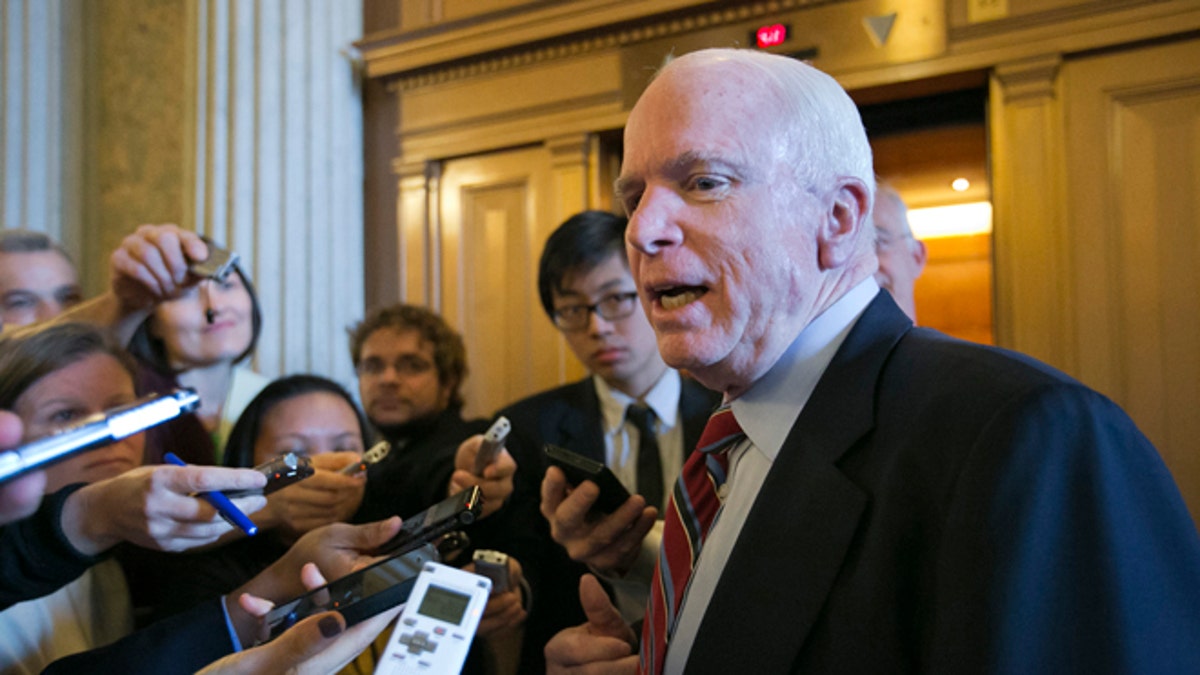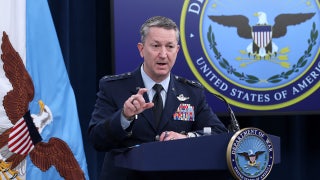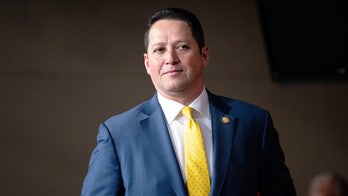
Sen. John McCain, R-Ariz. speaks with reporters on Capitol Hill in Washington, Thursday, March 7, 2013, as he leaves a GOP policy meeting. McCain was one of a small group of Republican senators who had dinner with President Barack Obama Wednesday night to address political gridlock. Republican Party divisions over immigration, anti-terrorism and other issues are bubbling to the surface just as President Barack Obama shows a new interest in capitalizing on GOP differences. (AP Photo/J. Scott Applewhite)
Washington – President Barack Obama is hoping to capitalize over the growing rift within the GOP over key issues such as anti-terrorism measures -- including domestic use of drones -- and how to solve the lingering immigration dilemma.
The latest example of the schism among Republicans played out Thursday on the Senate floor, where two Republican senators rebuked a third — tea party favorite Rand Paul of Kentucky — for his filibuster that challenged U.S. policies for using drones to kill suspected terrorists.
Just a few days earlier, other high-profile Republicans had differed on immigration, and a House committee chairman renewed his call for spending cuts that would go much deeper than those now making headlines.
Every case featured past or possibly future presidential candidates. It was a fresh reminder that the party has no clear leader, and no clear road map, after Mitt Romney's November loss to Obama.
The president recognizes the fractures within the Republican Party and is moving to try to take advantage of them with a charm offensive.
The quarrels also underscore the Republican establishment's uneasy relationship with the tea party. That grass-roots movement, born in 2009, pumped new passion into the GOP, but it also fueled unwise Senate nominations that saved several endangered Democrats.
Every party undergoes self-examination and blame-swapping after losing a presidential race. The Republicans' intramural disputes may eventually lead to greater solidarity and popularity.
Other internal debates that Republicans must resolve include changes to immigration laws. Romney and other GOP candidates did poorly among Hispanic voters, many of whom see the party's immigration policies as a slap at all Latinos.
Rubio, the son of Cuban immigrants, is heading a Republican effort to craft immigration legislation to counter Obama's proposals.
Another prominent Republican, former Florida Gov. Jeb Bush, created a stir this week by saying he did not support a pathway to citizenship for illegal immigrants, even if they have lived peacefully for years in the United States. Bush, whose father and brother were presidents, tried to soften the comments later, but they served to remind everyone that Republicans face difficult debates over immigration.
The 2016 presidential race could possibly attract Bush, Rubio, Ryan, Paul, Thune and numerous other Republicans, including Govs. Chris Christie of New Jersey and Bobby Jindal of Louisiana.
The 2012 Republican primary featured exhaustive and often unwieldy debates. Catering to hard-core conservatives who dominate primaries, Romney and his rivals veered to the right on many issues, a process that many feel hurt Romney among centrist voters in the general election against Obama.
With tea party-backed House Republicans thus far dominating the tax-and-spending debate, it's unclear whether the GOP can avoid similar clashes in 2016. Before it confronts that question, however, the party must move closer to consensus and intraparty peace over immigration, anti-terrorism and other matters.
This week's back and forth in the Senate indicates the soul-searching will go on a while longer.
Based on reporting by the Associated Press.
Follow us on twitter.com/foxnewslatino
Like us at facebook.com/foxnewslatino












































